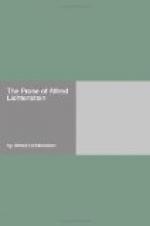Kohn did not pay much attention to his injured hump. He sat down again at the table with Lisel Liblichlein, and ordered tea with lemon. She saw how ever more clearly blood was oozing through his threadbare jacket.She called his attention to the bloody jacket; he became frightened. She asked if she should bind the wound—He said bitterly, to touch a hump would not be pleasant for her. She said, blushing sympathetically, that a hump was human. She said that he could come to her place. The hump must be cleaned and cooled. Then she would apply a dressing. He could spend the afternoon at her place...
Happily and hesitantly Kohn agreed to her suggestion. They sat into the night in Lisel Liblichlein’s little room. They talked about souls, humps, love.-From that day on the writer Schulz was missing. An acquaintance had last seen him in the evening, in front of the display window of a shoe store. “Hot Heroes”—a journal for romantic decadence—received a special-delivery letter, in which Schulz reported that, for pyschological
reasons, he was on the point of taking his own life. Some people regarded this as nothing really new. Most people were excited. The newspapers carried exciting notices. A fund to find Schulz’ body was established. An owner of a factory donated a tasteful coffin.
Woods and fields were searched. All the lakes were probed with long poles. No trace of Schulz was found. They already wanted to give up the search, when they found him disfigured, in a middle-level hotel in a distant suburb. On a windy pond he had contracted influenza, which had kept him in bed for a week. He was found on the creaky steps of the hotel, covered with many blankets and shawls, experimenting with the idea of carrying out his intention of committing suicide. It was not difficult to dissuade him, and he was brought in triumph back to the city. The coffin was sold off. From the profits and the remainder of the fund to find Schulz’ body a party for Bohemians was organized-Gottschalk Schulz himself was enthroned as Faust, world-weary, in a corner. The gifted Doctor Berthold Bryller appeared as one of the wealthy literati. Lutz Laus played the Pope. The high school teacher Spinoza Spass—the clown of the Cafe Kloesschen—had wrapped a Siegfried-costume around his belly, and given himself a Goethe haircut. The lyric poet Mueller soon lay like a green, drunken corpse. Kuno Kohn, who had made a formal reconciliation with Schulz, came as himself. Lisel Liblichlein also came with him, wearing a rustic outfit. The others scuttled back and forth wildly among themselves, screeching like Chinese, chimpanzees, Gods, nightwatchmen, sophisticates. The whole crowd from the Cafe Kloesschen was present.




